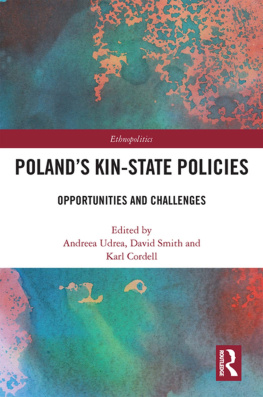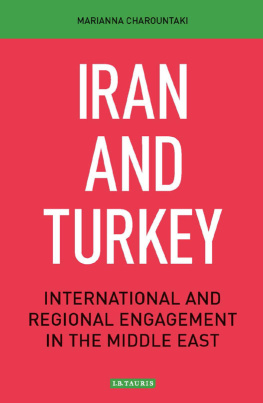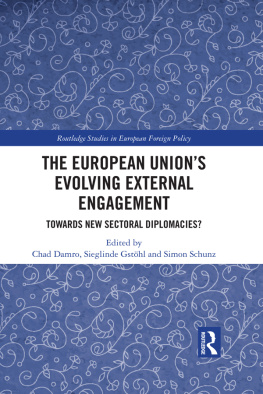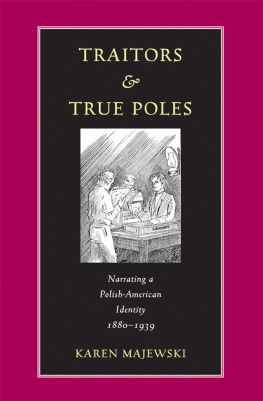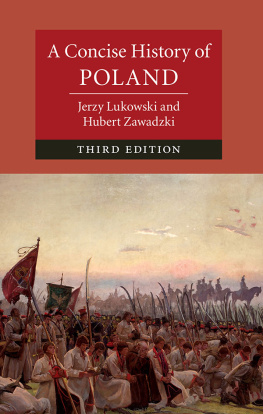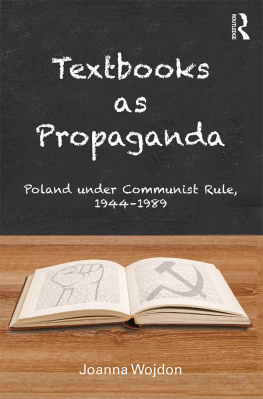Polands Kin-State Policies
The increased engagement of states with their co-ethnics abroad has recently become one of the most contentious features of European politics. Until recently, the issue has been discussed predominantly within the paradigm of international security; yet a review of the broader European picture shows that kin-state engagement can in fact have a positive societal impact when it actually responds effectively to the claims formulated by co-ethnic communities themselves.
Polands Kin-State Policies: Opportunities and Challenges offers new insights into this issue by examining Polands fast-evolving relationship with Polish communities living beyond its borders. Its central focus is the Act on the Polish Card (generally known as Karta Polaka). Tracing policymaking processes and the underlying political agendas that have shaped them, the volume situates Polands engagement within broader conceptual and normative debates around kin-state and diaspora politics and explores its reception and impact in neighbouring states (Ukraine, Germany, Lithuania). The volume highlights how the issue of co-ethnics abroad is increasingly being instrumentalised, most especially for the purposes of attracting labour migration to resolve the demographic crisis in Poland.
The chapters in this book were originally published as a special issue of the journal Ethnopolitics.
Andreea Udrea co-convenes KINPOL Observatory on Kin-state Policies at the University of Glasgow. With Professor David Smith, she led a two-year project entitled Polands Kin-state Policies: Opportunities and Challenges funded by the Noble Foundation Programme on Modern Poland.
David Smith is Professor and Alec Nove Chair in Russian and East European Studies at the University of Glasgow, where he co-convenes the KINPOL Observatory on Kin-state Policies and the Glasgow Baltic Research Unit.
Karl Cordell is Emeritus Professor of Politics at the University of Plymouth.
First published 2022
by Routledge
2 Park Square, Milton Park, Abingdon, Oxon, OX14 4RN
and by Routledge
605 Third Avenue, New York, NY 10158
Routledge is an imprint of the Taylor & Francis Group, an informa business
2022 The Editor of Ethnopolitics
All rights reserved. No part of this book may be reprinted or reproduced or utilised in any form or by any electronic, mechanical, or other means, now known or hereafter invented, including photocopying and recording, or in any information storage or retrieval system, without permission in writing from the publishers.
Trademark notice: Product or corporate names may be trademarks or registered trademarks, and are used only for identification and explanation without intent to infringe.
British Library Cataloguing-in-Publication Data
A catalogue record for this book is available from the British Library
ISBN13: 978-1-032-04028-8 (hbk)
ISBN13: 978-1-032-04029-5 (pbk)
ISBN13: 978-1-003-19028-8 (ebk)
DOI: 10.4324/9781003190288
Typeset in Times New Roman
by codeMantra
Publishers Note
The publisher accepts responsibility for any inconsistencies that may have arisen during the conversion of this book from journal articles to book chapters, namely the inclusion of journal terminology.
Disclaimer
Every effort has been made to contact copyright holders for their permission to reprint material in this book. The publishers would be grateful to hear from any copyright holder who is not here acknowledged and will undertake to rectify any errors or omissions in future editions of this book.
The chapters in this book were originally published in the Ethnopolitics, volume 20, issue 1 (January 2021). When citing this material, please use the original page numbering for each article, as follows:
Karta Polaka, Poland and its Co-ethnics Abroad
Andreea Udrea, David Smith and Karl Cordell
Ethnopolitics, volume 20, issue 1 (January 2021) pp. 111
Chapter 2
Karta PolakaNew Wine in Old Bottles
Dorota Pudzianowska
Ethnopolitics, volume 20, issue 1 (January 2021) pp. 1224
Chapter 3
The Paradoxical Nature of Diaspora Engagement Policies: A World Polity Perspective on the Karta Polaka
Bastian Sendhardt
Ethnopolitics, volume 20, issue 1 (January 2021) pp. 2538
Chapter 4
Divided Nationhood and Multiple Membership: A Framework for Assessing Kin-State Policies and Their Impact
Myra A. Waterbury
Ethnopolitics, volume 20, issue 1 (January 2021) pp. 3952
Chapter 5
Pragmatic Trans-Border Nationalism: A Comparative Analysis of Polands and Hungarys Policies Towards Kin-Minorities in the Twenty-First Century
Magdalena Lesiska and Dominik Hjj
Ethnopolitics, volume 20, issue 1 (January 2021) pp. 5366
Chapter 6
Minority Protection and Kin-State Engagement: Karta Polaka in Comparative Perspective
Andreea Udrea and David Smith
Ethnopolitics, volume 20, issue 1 (January 2021) pp. 6782
Chapter 7
The Polish Minority in Germany: Marginal or Marginalised?
Karl Cordell
Ethnopolitics, volume 20, issue 1 (January 2021) pp. 8395
Chapter 8
Between Two Kin-States: The Round Table Meetings on the German Minority in Poland and the Poles in Germany 20102019
Sawomir odzinski
Ethnopolitics, volume 20, issue 1 (January 2021) pp. 96108
Chapter 9
Relations Between Polish Immigrant Organisations in Germany and Institutions of the Polish and German States
Micha Nowosielski
Ethnopolitics, volume 20, issue 1 (January 2021) pp. 109122
Chapter 10
Does Polish Origin Matter? The Integration Challenges of Polish Card Holders in Poland
Myroslava Keryk
Ethnopolitics, volume 20, issue 1 (January 2021) pp. 123135
Chapter 11
Identities of and Policies Towards the Polish National Minority in Lithuania
Diana Januauskien
Ethnopolitics, volume 20, issue 1 (January 2021) pp. 136149
Chapter 12
National Bonds, Foreign Policy and the Future of Europe
Jan Zielonka
Ethnopolitics, volume 20, issue 1 (January 2021) pp. 150156
For any permission-related enquiries please visit: http://www.tandfonline.com/page/help/permissions
Karl Cordell University of Plymouth, UK.
Dominik Hjj Cardinal Stefan Wyszynski University in Warsaw, Poland.
Diana Januauskien Lithuanian Social Research Center, Lithuania.
Myroslava Keryk Our Choice Foundation/Institute of Philosophy and Sociology of Polish Academy of Sciences, Poland.
Magdalena Lesiska University of Warsaw, Poland.

